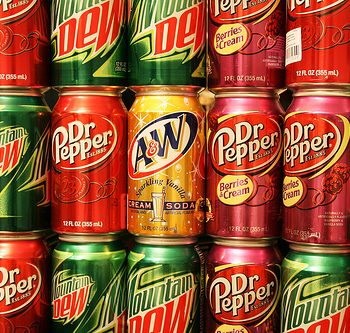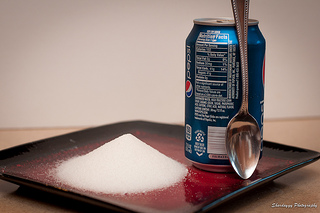American history shows that even something as simple as a drink can stir up political passions when the government gets involved.
The patriots in Boston were incensed over a tax on tea. Two of twenty-seven U.S. constitutional amendments deal with the sale of alcohol.(a) And now, the recent decision by New York City to ban the sale of large sugary drinks has created a whirlwind of political controversy. Like the Boston Tea Party and Prohibition before it, the ban provides an excellent case study for an armchair philosopher interested in the relationship between government power and individual freedom.
The new policy, championed by Mayor Bloomberg and set to go into effect in March, will prohibit the restaurant, theater, and street cart sale of any cup or bottle of a sweetened drink larger than 16 fluid ounces. New Yorkers will still be able to buy and consume fruit juices, milk-based beverages, alcoholic drinks, and diet sodas larger than 16 ounces, as well as a limitless number of smaller portions of sugary drinks. Supporters of the law point to the city’s interest in promoting citizens’ health, since research shows that sugary drinks contribute to obesity, one of the most significant health problems in the United States.1 Opponents argue that imposing such a law would be drastic and go too far in limiting individual choices.(b) What can political theory teach us about the appropriate role for government in a case like this?
One way political philosophers understand freedom and autonomy is by thinking in terms of constraints. Most libertarians and many liberals today believe that the harm principle, first outlined by philosopher John Stuart Mill in his famous book On Liberty, is the appropriate boundary for establishing the limits of law.2 The principle asserts a prior constraint on the state’s power to interfere in the private affairs of individuals, which should be waived only when intervention is required to prevent harm one individual might do to another. Many think that under this principle some bans on unhealthy activities, such as indoor smoking in public places, are justified when those activities constitute a harm one individual might inflict on another.
There is, however, another way to conceptualize what freedom and autonomy imply within a liberal political framework. The consequentialist approach asserts that the best course of action is the one that creates the largest amount of good. This tradition goes back all the way to Aristotle, who claimed that the role of the state is to create a good life for its citizens. Translated into modern circumstances, this philosophy suggests that refraining from interference in private affairs is only one of the tools the state has for protecting individual autonomy. It can, in principle, be outweighed by other, more important considerations about the quality of lives people lead.3These considerations concern the consequences of certain acts and practices, even those that don’t harm others, and interpret freedom and autonomy in terms of these consequences. For example, the ban on the sale of heroin, although it infringes upon the individual freedom to buy and consume the drug (which some might argue does not necessarily harm anybody but the user) is justified within a consequentialist liberal framework. Being highly addictive, heroin severely diminishes individual well-being and limits the capabilities of individuals to make autonomous choices, thus decreasing their overall freedom.
The New York City soda law is a consequentialist proposal because it exemplifies a concern for individual freedom and autonomy interpreted in terms of consequences. It limits one freedom – the ability to buy any size of sugary drink – in order to promote others deemed more important – health and well-being. The approach is supported by recent research showing that sugar can be physically addictive.(c) If this is true, then it seems plausible that limiting the availability of sugary drinks promotes personal freedom, because addictions deteriorate individual abilities to make fully autonomous decisions. If the ability to moderate one’s consumption of sugar is diminished due to its addictive features, then the obesity that results from limitless sugar intake constitutes a health problem that justifies wider state intervention.(d)
However, given that the levels of addiction differ significantly between heroin and sugar, as do the substances’ effects on human health, an outright ban on the consumption of sugar would be unjustified. Part of the purpose of the law seems to be motivating individuals to be aware of the amounts of sugar they consume and encouraging them to make conscious decisions when to go beyond the suggested health limit.(e) That is why one can argue that a limit on the size of one portion, rather than a total ban on sugary drinks, strikes the right measure of regulation: it protects the rights of commerce and trade, but also promotes individual freedom and well-being.4 Individual autonomy, as a form of well-being, is not only promoted in the long run, but also given the opportunity to be exercised as a conscious decision to reach for an additional cup (or more) of soda.
Endnotes
- Several articles in the October 11, 2012 issue of the New England Journal of Medicine (Volume 367) address the link between the consumption of high-calorie, sugar-sweetened drinks and weight gain in children and adolescents. These include: Sonia Caprio, “Calories from Soft Drinks — Do They Matter?”, p. 1462-1463; Janne C. de Ruyter, Margreet R. Olthof, Jacob C. Seidell, and Martijn B. Katan, “A Trial of Sugar-free or Sugar-Sweetened Beverages and Body Weight in Children,” p. 1397-1406; and Cara B. Ebbeling, Henry A. Feldman, Virginia R. Chomitz, Tracy A. Antonelli, Steven L. Gortmaker, Stavroula K. Osganian, and David S. Ludwig, “A Randomized Trial of Sugar-Sweetened Beverages and Adolescent Body Weight,” p. 1407-1416.
- John Stuart Mill (1859) On Liberty.
- For more on the consequentialist approach, see Gerald Dworkin (1988), The Theory and Practice of Autonomy, New York: Cambridge University Press.
- For a good overview of different elements in ethical reasoning, including arguments about the harm principle and the promotion of goodness, see Shelly Kagan (1998), Normative Ethics, Boulder: Westview Press.
Sidenotes
- (a) The 18th Amendment banned the production and sale of alcohol from 1920 to 1933, when it was repealed by the 21st Amendment. The 21st was the only amendment to the U.S. constitution whose sole purpose was to repeal a previous amendment.
- (b) A poll conducted by the New York Times last summer found that 60% of New York City residents thought the soda ban was a bad idea, while 36% felt it was a good idea. The most common reason people disapproved of the ban was a belief that individuals should have the freedom to determine what beverages to consume.
- (c) Some studies have found evidence of sugar addiction in rats and mice, and even indications that sugar may, in some cases, be more addictive than cocaine. Sugar intake produces dopamine in the brain, which causes positive, happy feelings in both humans and animals.
- (d) Moreover, one could make a claim that severely obese individuals are less free and autonomous than non-obese ones: they may have a limited scope of physical movement and, in extreme cases, may be dependent on a caregiver for the performance of basic everyday tasks, from climbing stairs to taking a shower.
- (e) Visualizations of the amount of sugar in even a 12 ounce can of soda, the sale of which remains permitted, can be quite shocking.






